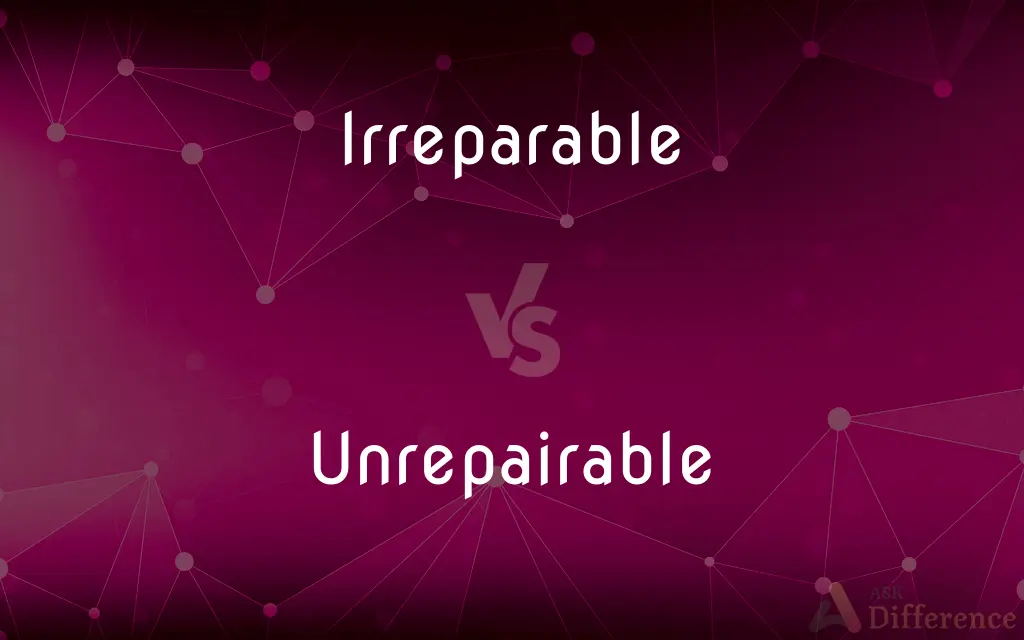Irreparable vs. Unrepairable — What's the Difference?
Edited by Tayyaba Rehman — By Fiza Rafique — Updated on February 24, 2024
Irreparable and unrepairable both describe something that cannot be fixed, but irreparable often implies deeper, non-physical damage, while unrepairable is more straightforward and technical.

Difference Between Irreparable and Unrepairable
Table of Contents
ADVERTISEMENT
Key Differences
Irreparable damage typically refers to situations where restoration is impossible, not only physically but also in terms of relationships, reputations, or emotional states. It suggests a level of harm that goes beyond surface damage, affecting the very essence or functionality of something or someone. Unrepairable, on the other hand, is used in a more literal sense, indicating that an object or system is beyond repair due to technical, physical, or structural reasons. It's straightforward and focuses on the practical impossibility of fixing something.
When something is described as irreparable, it often carries an emotional or symbolic weight, implying that the damage has profound and lasting effects. For example, trust once broken might be considered irreparable. In contrast, unrepairable is typically reserved for objects or situations where the focus is on the material or mechanical aspect, such as a device that can no longer function and cannot be fixed.
The nuance between irreparable and unrepairable becomes important in communication, especially in conveying the depth and nature of damage or loss. Using irreparable in contexts like environmental damage or personal loss emphasizes the profound impact and the impossibility of returning to the original state. Unrepairable would be more appropriate when discussing machinery, electronics, or structures where the emphasis is on the physical state and the feasibility of repair.
Despite their differences, both terms underscore a point of no return, marking a situation or condition as beyond recovery. The choice between irreparable and unrepairable hinges on the context and the type of damage being described, whether it's metaphorical, emotional, or strictly physical.
Comparison Chart
Definition
Beyond repair, especially in non-physical contexts
Incapable of being repaired, mainly physical items
ADVERTISEMENT
Usage Context
Emotional, relational, reputational damage
Technical, structural, mechanical damage
Implication
Deep, lasting damage beyond surface level
Practical, physical impossibility of repair
Examples
Trust, relationships, environmental damage
Machinery, electronics, structures
Emotional Weight
Often carries a heavier emotional or symbolic meaning
Generally lacks emotional or symbolic weight
Compare with Definitions
Irreparable
Damage that cannot be undone or restored.
The scandal caused irreparable harm to his reputation.
Unrepairable
Referring to objects that are beyond fixing.
The water damage to the phone was unrepairable.
Irreparable
Indicating permanent loss or destruction.
The forest fire caused irreparable damage to the ecosystem.
Unrepairable
Used for items where repair attempts have failed.
After many attempts, the watch remained unrepairable.
Irreparable
Beyond the possibility of repair in relationships.
The betrayal led to an irreparable rift between the friends.
Unrepairable
Something that cannot be fixed or restored to working condition.
The old car was deemed unrepairable after the crash.
Irreparable
Relating to irrecoverable conditions or states.
The accident left her with irreparable injuries.
Unrepairable
Describing a state where repair is not feasible.
The computer's motherboard suffered unrepairable damage.
Irreparable
Used to describe situations with lasting impact.
The comments made an irreparable dent in the community's harmony.
Unrepairable
Pertaining to situations where repair is not an option.
The flood damage to the house was largely unrepairable.
Irreparable
Impossible to repair, rectify, or amend
Irreparable harm.
Irreparable damages.
Unrepairable
Impossible to repair.
Irreparable
Incapable of being repaired, amended, cured or rectified; unrepairable.
Irreparable
Not reparable; not capable of being repaired, recovered, regained, or remedied; irretrievable; irremediable; as, an irreparable breach; an irreparable loss.
Irreparable
Impossible to repair, rectify, or amend;
Irreparable harm
An irreparable mistake
Irreparable damages
Common Curiosities
What makes something irreparable?
Something is irreparable when the damage affects its essence or functionality so deeply that restoration to the original state is impossible, often involving emotional or symbolic aspects.
How do I know if something is irreparable or unrepairable?
Assessing whether something is irreparable or unrepairable involves understanding the nature and extent of the damage and whether it affects the core functionality, emotional value, or structural integrity.
Can a relationship be unrepairable?
While "unrepairable" is less commonly used for relationships, it can apply, especially when emphasizing the practical impossibility of mending the relationship due to specific issues or circumstances.
Is all physical damage unrepairable?
Not all physical damage is unrepairable; many items can be fixed with the right tools and expertise. "Unrepairable" is reserved for situations where repair is not feasible.
Can environmental damage be considered irreparable?
Yes, environmental damage can be considered irreparable when it leads to permanent loss or change in an ecosystem, species extinction, or significant alteration of natural landscapes.
Can software be unrepairable?
Software can become effectively unrepairable if it's severely corrupted, outdated, or incompatible with current systems, requiring replacement rather than repair.
Can irreparable harm be compensated for?
While compensation might be offered for irreparable harm, especially in legal contexts, it may not fully restore the loss or damage experienced, particularly in emotional or symbolic terms.
What does it mean when a doctor says an injury is irreparable?
When a doctor describes an injury as irreparable, it means the damage is so severe that full recovery or restoration to the original physical condition is not possible.
How does insurance handle irreparable or unrepairable items?
Insurance policies may cover the replacement or compensation for irreparable or unrepairable items, depending on the terms and the nature of the damage.
Can technology be irreparable?
Technology can be considered irreparable if the damage impacts its foundational or operational integrity to a point where it cannot be restored, though "unrepairable" is more commonly used in this context.
Are irreparable and unrepairable interchangeable?
While they can sometimes be used interchangeably, especially in casual conversation, their nuances make them more suitable for different contexts, with irreparable often carrying a deeper, more emotional or symbolic meaning.
Is it possible to prevent something from becoming unrepairable?
Preventative maintenance, careful handling, and timely repairs can often prevent items from becoming unrepairable by addressing issues before they lead to significant damage.
What's the difference in emotional impact between irreparable and unrepairable?
Irreparable damage often has a significant emotional impact due to its implications for loss, change, or destruction beyond physical repair, whereas unrepairable is more technical and less likely to carry emotional weight.
Can a business suffer irreparable damage?
Yes, a business can suffer irreparable damage if its reputation, customer trust, or market position is harmed to a degree that cannot be fully restored.
Is it more common for environmental issues to be described as irreparable or unrepairable?
Environmental issues are more commonly described as irreparable due to the lasting and profound impact on ecosystems, species, and natural resources, beyond mere physical repair.
Share Your Discovery

Previous Comparison
Length vs. Height
Next Comparison
Drivetrain vs. PowertrainAuthor Spotlight
Written by
Fiza RafiqueFiza Rafique is a skilled content writer at AskDifference.com, where she meticulously refines and enhances written pieces. Drawing from her vast editorial expertise, Fiza ensures clarity, accuracy, and precision in every article. Passionate about language, she continually seeks to elevate the quality of content for readers worldwide.
Edited by
Tayyaba RehmanTayyaba Rehman is a distinguished writer, currently serving as a primary contributor to askdifference.com. As a researcher in semantics and etymology, Tayyaba's passion for the complexity of languages and their distinctions has found a perfect home on the platform. Tayyaba delves into the intricacies of language, distinguishing between commonly confused words and phrases, thereby providing clarity for readers worldwide.














































